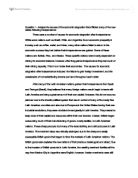A comparative study of two Latin American revolutions exhibits the causes and effects necessary to define a struggle for independence. Through examining the Haitian and Brazilian independence movements, the differences between the fight for freedom and re
Tran
Thuy-Khue Tran
Mrs. Pereira
15 October 2009
IB History of the Americas 3-4
The history of Latin America endured a period that was riddled with conquest and a series of wars of independence. A comparative study of two Latin American revolutions exhibits the causes and effects necessary to define a struggle for independence. Through examining the Haitian and Brazilian independence movements, the differences between the fight for freedom and reform in Latin America become clear. The people of Haiti instigated their revolution - a true grass root movement. On the contrary, Brazil’s movement for reform was strictly a consequence of a shift of political power from different authorities. In both countries, a driving force caused the people of Haiti and Brazil to commence a movement for change. Just as important as the causes of a war are the effects and the aftermath of the battle; at times the war is started to benefit the people and in other cases the war is fought for the advantage of the privileged and elite. The primary struggles, techniques and effects of the Haitian and Brazilian drive for independence visibly provide evidence as to why and how these two revolutions are distinct from one another.
The Haitian revolution is unique in the sense that it was commenced and supported by the oppressed slave population of the small French inhabited island. Although there were clear divisions in the classes, each level of the social hierarchy – peninsulares, creoles, mulattos, and natives- contributed to the vast oppression of thousands of black slaves. Despite the exposure to this unified racism, “Haiti was the first of the New World to sweep racism aside (Franklin 79).” The imprisoned and beaten slaves had a dream for freedom and vengeance. The war was bloody, gruesome and long drawn out because the Haitian revolution was propelled forward by the passions of men and women who had been enslaved all their lives and these people hungered for revenge. The conditions were ripe for a revolution for the Enlightenment ideas motivated slaves to fight for their natural rights and liberties. The slaves cultured and nurtured the idea that “people of color could have decided on their own to overturn the social order established by whites (Popkin 18)” for they refused to settle for anything less than freedom. As a result, the main cause of Haiti’s social movement for reform was to establish equality for all people and to permanently abolish slavery. Thus the Haitian war centered around the new ideals for equal opportunity and liberation.







